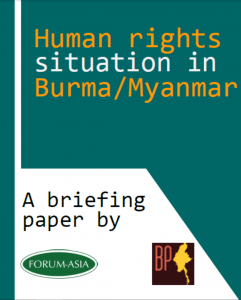Human Rights situation in Burma/Myanmar
By Burma Partnership and Forum Asia • March 2, 2016 The year 2015 will be remembered as a momentous year for Burma/Myanmar as the National League for Democracy (NLD), led by Daw Aung San Suu Kyi, clinched an emphatic victory in the 8 November polls. However, the main challenges that impede a full and genuine democratic transition remain. Impunity remains deeply entrenched in the key institutions and structures of governance and the Burma/Myanmar Army- the main perpetrator of pervasive human rights violations and abuses in the country for decades- remain untouched and still wield far-reaching powers despite the bruising electoral loss by the Army backed Union Solidarity and Development Party (USDP).
The year 2015 will be remembered as a momentous year for Burma/Myanmar as the National League for Democracy (NLD), led by Daw Aung San Suu Kyi, clinched an emphatic victory in the 8 November polls. However, the main challenges that impede a full and genuine democratic transition remain. Impunity remains deeply entrenched in the key institutions and structures of governance and the Burma/Myanmar Army- the main perpetrator of pervasive human rights violations and abuses in the country for decades- remain untouched and still wield far-reaching powers despite the bruising electoral loss by the Army backed Union Solidarity and Development Party (USDP).
No amount of optimism or plaudits can hide or gloss over the gross human rights situation that has admittedly worsened this past year, particularly in ethnic areas. Despite the on-going peace process, which includes the signing of the non-inclusive ‘Nationwide Ceasefire Agreement’ (NCA) in October 2015, and the Union Peace Conference (UPC) in January 2016, the Burma/Myanmar Army continues to commit gross human rights violations that may constitute crimes against humanity and war crimes, including the routine use of torture, sexual violence and extra-judicial killings, in both ceasefire and non-ceasefire areas. The escalation of conflict, particularly around the NCA signing and General Elections, now includes the regular use of aerial firepower and has led to a continuation of forced displacement of civilians in ethnic minority areas.
Download the full briefing paper in English here.
Tags: Burma Partnership, Crimes against humanity, Forum-Asia, Freedom of Expression, Human Rights, National League for Democracy, Nationwide Ceasefire Agreement, Union Solidarity and Development PartyThis post is in: ASEAN, Business and Human Rights, Crimes Against Humanity, Displacement, Economy, Ethnic Nationalities, Human Rights, International Relations, Law, Military Regime, Political Prisoners, Women
Related PostsBurma Partnership Celebrates Continuing Regional Solidarity for Burma and Embraces the Work Ahead for Progressive Voice
Burma Army Displays Blatant Disregard for 21st Century Panglong Peace Process
Ann Din Coal Power Plant: Local Movement and Action to Preserve and Protect Natural Resources and Land: Mon IDP Report Case Study #4
Latest Human Rights Abuse Case Demonstrates Urgent Need to Reform the Myanmar National Human Rights Commission
Human Rights Far From Guaranteed as US Sanctions on Burma Are Removed









 All posts
All posts